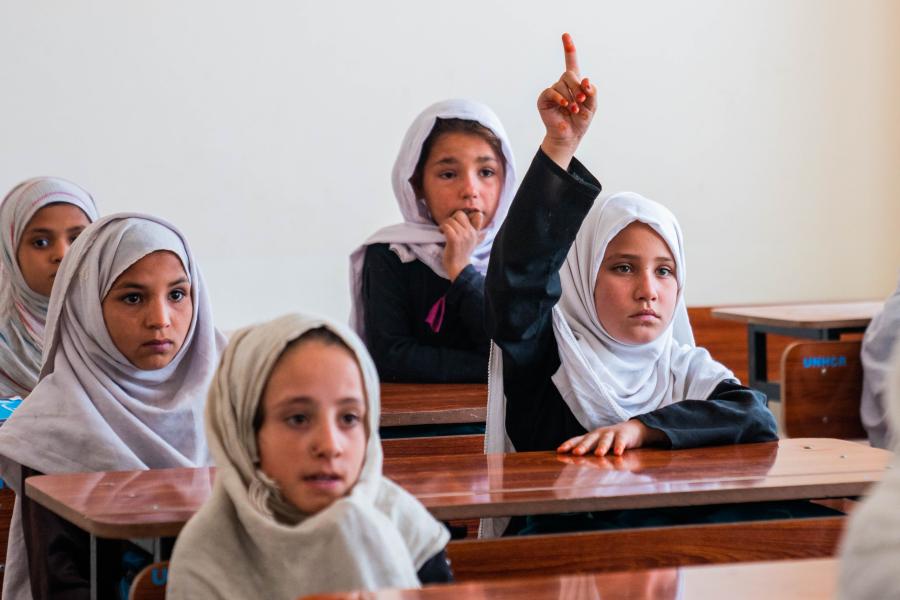Main documents
There are 2.6 million registered Afghan refugees worldwide with 2.2 million registered in Iran and Pakistan alone. Another 3.22 million people were internally displaced by the end of 2023, having fled their homes in search of refuge within Afghanistan.
Afghanistan has suffered more than 40 years of conflict, natural disasters, chronic poverty, and food insecurity. While hostilities ceased in 2021, conflict is no longer the primary driver of displacement. In addition to those who are internally displaced, Afghanistan continues to host 1.46 million IDP returnees, some 76,000 refugees who returned in 2023, and over 52,000 refugees. These groups urgently require both immediate protection and humanitarian assistance, as well as livelihoods support.
Moreover, Afghanistan continues to grapple with multiple humanitarian crises, deteriorating human rights (particularly for girls and women), economic instability, and severe climate shocks. In 2024, an estimated 23.7 million people – more than half of Afghanistan’s population – are projected to require humanitarian assistance.
The political uncertainty in Afghanistan reverberates across the region, demanding sustained attention and humanitarian efforts. UNHCR’s work in Afghanistan focuses on protecting the most vulnerable and assisting newly displaced Afghans with protection services, life-saving shelter, core relief items, and cash-based assistance, both within Afghanistan and in neighbouring countries. Together with our partners, we are committed to staying on the ground and delivering our emergency response as long as we can access those in need.
Explore UNHCR’s Operational Data Portal for more information and updates related to Afghanistan and the Afghanistan situation.
Populations
Population types
Note: The "Stateless" category does not include stateless people who are also in other categories, to avoid double counting. The total number of stateless, across all categories, is .
NB: 2025 figures are planning figures.
Source: UNHCR Refugee Data Finder for years until 2022, UNHCR planning figures (COMPASS) otherwise.
Population by country
NB: 2025 figures are planning figures.
Source: UNHCR Refugee Data Finder for years until 2022, UNHCR planning figures (COMPASS) otherwise.
Population by origin
NB: 2025 figures are planning figures.
Source: UNHCR Refugee Data Finder for years until 2022, UNHCR planning figures (COMPASS) otherwise.
Financials
Budget and expenditure trend
Budget information for the current year is updated monthly, while budget and expenditure information for all other years are final.
Budget by pillar
Budget by objective
Note: The table presents the budget for this operation broken down at the objective level. Resource allocation at the objective level is subject to change during the course of the year as the operational situation evolves and priorities shift. The current budget, reflected in the bottom line of this table, is updated on a monthly basis and is replaced by the final budget at year-end.
Expenditure by Outcome Area
Budget by Impact Area
Source: 2023 budget as approved by the Executive Committee in October 2022.
2022 current budget as approved by the High Commissioner as of October 2022; pending presentation to the ExCom's Standing Committee.
Budget by Outcome and Enabling Areas
Source: 2023 budget as approved by the Executive Committee in October 2022.
2022 current budget as approved by the High Commissioner as of October 2022; pending presentation to the ExCom's Standing Committee.
Budget by Impact Area
Source: 2024 budget and 2023 current budget are taken from the budget document approved by UNHCR's Executive Committee in October 2023.
Budget by Impact Area
Budget information for the current year is updated monthly, while budget and expenditure information for all other years are final.
Budget by Outcome and Enabling Areas
Budget by Outcome and Enabling Areas
Budget information for the current year is updated monthly, while budget and expenditure information for all other years are final.
Budget by Impact Area
Budget by Outcome and Enabling Areas
Strategy
Impact Statements
Latest updates
The boundaries and names shown and the designations used on this map do not imply official endorsement or acceptance by the United Nations.
UNHCR GIS data is publicly accessible in the Operational Data Portal








